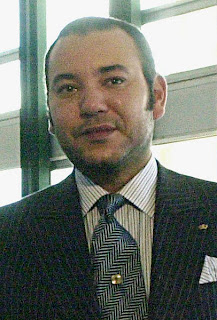I went to my house, and saw my grandma playing the zither, a Moroccan instrument. I said hello to her-my entire family would be offended if I didn’t show respect towards elders. I told my little sister about the football game, and then I went outside to play with my friend from school, Hassan. I am really excited for school tomorrow; we are going on a field trip to the beach! I think we are going to Tangiers Town Beach.
The tide is really high today, that makes it harder to pick up trash. Tangiers Town Beach isn't very clean, so our class picking up all the garbage that is on the shore, but there isn't very much trash with the high tide. The water is covering it all up. At first I thought that would make our job easy, but I guess we have to go to the picnic tables for lunch, and we're going to pick up the trash when high tide is over. Yum.... my mom packed me some salad and couscous."Hey, Hassan, what did your mom pack you?"
"Oh not much, just some bread and Lamb," he said.
"JUST some lamb? Lamb is a really special treat! How could it be so ordinary for you to have; it's so expensive." I said.
"Well, my dad just got a new job in Rabat. He is making a lot more money now that he works in a big city, and I guess eating more lamb is the result of it all." he explained.
"Okay class," our teacher said, "Now it is time to pick up the trash. The tide has gone down significantly, and I see a lot of things to pick up." We headed down towards the beach, and started to pick up every piece of garbage. I grabbed a coca-cola bottle, a couple plastic bags, and an old newspaper that said, "Vegetable Prices Rising by 18%."
It was time to swim. As I put on some sunscreen, I saw Hassan head towards the water. A couple minutes later, when I was just finishing up the sunscreen on my  ears, I heard a scream. it was Hassan. He was being pulled out into the ocean, towards a school of Piranhas. I could see their gleaming eyes staring at Hassan's shiny watch. He desperately waved his arms and tried to swim back to shore, but the current was too strong. I knew I had to do something. The wind was picking up, and storm clouds were starting to shadow the beach. I had to get Hassan out of there before he was pulled out into the ocean, bitten by piranhas, and struck by lightning.
ears, I heard a scream. it was Hassan. He was being pulled out into the ocean, towards a school of Piranhas. I could see their gleaming eyes staring at Hassan's shiny watch. He desperately waved his arms and tried to swim back to shore, but the current was too strong. I knew I had to do something. The wind was picking up, and storm clouds were starting to shadow the beach. I had to get Hassan out of there before he was pulled out into the ocean, bitten by piranhas, and struck by lightning.
I knew I must first distract the piranhas. I rapidly unscrewed the shiny bottle cap off of the coke bottle, and I threw it as far as I could. The cap landed only three meters away from Hassan. I was aiming for a further distance, but for now, that would have to do. I had no time to mess around. I quickly ran up to cowboy-obviously a tourist-riding his horse on the beach. He had a long rope in his hand. I told him the situation, and at first he didn't understand me. I got my point across with actions and sign language. He immediately gave me the rope. I tried to cast it out to Hassan, but I couldn't reach. I felt desperate for some sort of help. Suddenly, the cowboy was standing right behind me. He threw the rope incredibly far, and Hassan barely grabbed it. I tried to pull him in, but the current was too strong. The cowboy started to help me, but the current was too strong for the both of us. Then all of a sudden it felt like we were able to pull Hassan in. I looked behind myself, and my whole class was pulling and tugging on the rope.
Finally, he reached the shore, and the piranhas swam away. We wrapped a towel around Hassan, and then everyone got onto the bus. We had just seen a flash of lightning. Our swimming trip might have been cancelled because of the weather, but at least my friend is safe.






